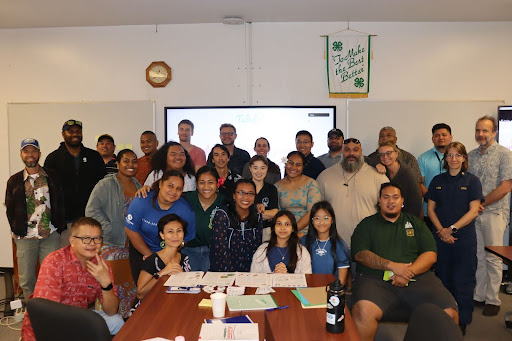In the beginning of August, researchers from the University of Hawaiʻi Water Resources Research Center (WRRC) and the East-West Center traveled to Pago Pago, Tutuila, for a research engagement workshop co-organized by WRRC and the American Samoa Community College (ASCC). The UH team was led by Mia Comeros and Leah Bremer and included newly appointed WRRC Director Tao Yan, Marek Kirs, Chris Shuler, Bryceson Tugade, and Ryan Longman. The workshop aimed to strengthen relationships between researchers and the local community through talanoa ma faasoa/faafofoga (dialogue and listening) sessions, fostering an environment of mutual respect and shared learning. Over 40 resource managers, educators, students, engineers, and environmental regulators from 12 territorial and federal agencies, a non-profit group, and Tafuna High School attended, bringing diverse perspectives on pressing water resource issues in American Samoa.

The discussions centered on six key research and management priorities: protecting and improving water quality, addressing climate change, enhancing watershed and land management, conserving natural ecosystems, upgrading water infrastructure, and engaging the community through outreach and education, which were identified by participants and agencies such as the American Samoa Environmental Protection Agency, Coral Reef Advisory Group, American Samoa Power Authority, and ASCC’s Agriculture, Community, and Natural Resources Division. Participants highlighted the critical need to manage stormwater runoff, combat deforestation, and reduce pollution from sedimentation and nutrient runoff. The importance of coral reef conservation, sustainable fishing practices, and safeguarding drinking water sources was also a major focus. Despite the unique priorities of each agency, there was a unified commitment to improving water quality, addressing environmental challenges, and involving the community in conservation efforts.
Director Tao Yan emphasized the importance of ongoing, reciprocal dialogue to ensure research initiatives align with the community’s needs and values. The workshop underscored the necessity of collaborative approaches to tackling the interconnected challenges of water resource management, environmental protection, and climate resilience in the territory.

The emphasis throughout the workshop was on developing solutions informed by local knowledge and grounded in community values. Participants valued the opportunity to engage directly with researchers and decision-makers, fostering a sense of shared responsibility and collaboration. The insights and priorities shared during the workshop will guide the next steps for WRRC in co-developing research projects, proposals, and educational initiatives that reflect the needs and aspirations of the people of American Samoa.